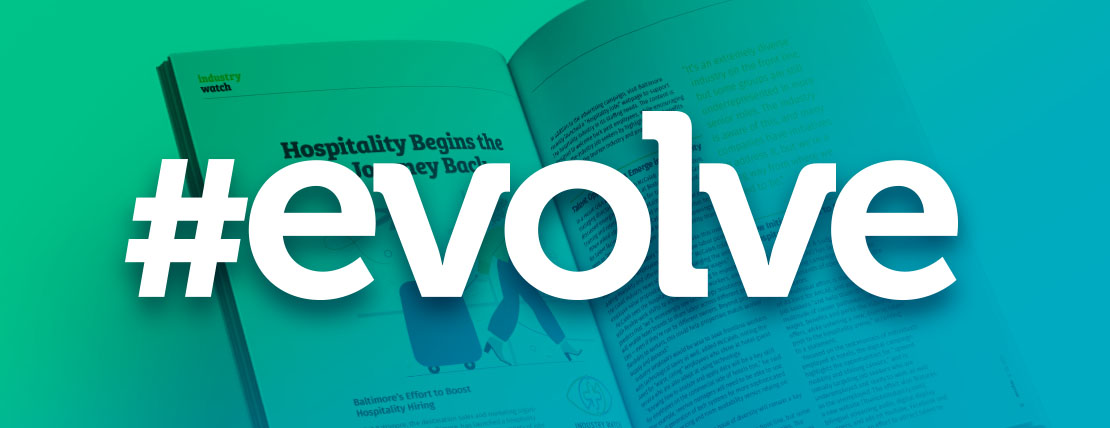When historians have their say on 2020, the year will inevitably be defined by the coronavirus pandemic. And rightfully so. Covid-19 upended every aspect of our lives for the entirety of last year. And, as we near the end of 2021, the deadly virus isn’t quite through with us yet. But the retelling of 2020 shouldn’t end with the coronavirus pandemic. For example, names such as Breonna Taylor and George Floyd will be an integral part of this historically unique year’s story. Their deaths — and the deaths of other black men and women at the hands of law enforcement officers — turned up the spotlight on racial equity and social justice issues in America and made movements such as Black Lives Matter a much bigger part of the national agenda.
These conversations around racial justice can certainly be challenging and, at times, uncomfortable. That’s especially true in the workplace. While 2020 seemed to nearly (and maybe permanently) obliterate the thin line between the personal and professional, some sort of distance should remain between the two.
Still, employees want to feel safe in expressing their opinions at work. And many feel that not only should they be able to broach such subjects at the office, but also that their employers have a duty to engage on social justice matters.
For example, a poll conducted by Benevity found that 80% of U.S. employees feel that company leaders have a responsibility to take action toward addressing racial justice and equity issues.
The same survey finds that many employers have some progress to make on this front, though. As many as seven in 10 employees polled report that they haven’t seen their employer devote company resources to address social justice matters, with close to half (47%) saying they have failed to see leadership at their organization practice more racial sensitivity following George Floyd’s death.
So how do organizations create an environment in which employees are able to share their views on potentially explosive subjects such as social justice, while making clear that there are some lines that can’t be crossed?
Mishell Parreno Taylor and Raquel Zilberman Rotman, attorneys in the San Diego office of employment law firm Littler, sat down for a Q&A with #evolve to talk about how employers can strike this difficult balance.
#evolve: Social justice issues affect every aspect of American life, including the work experience. What can employers do to ensure that their culture is one in which employees feel safe and comfortable having honest discussions about social justice and racial equality?
Parreno Taylor: I think the key starting point on this is leadership setting the tone by ensuring that employees understand that the workplace is a safe place to bring your whole self to work, if you will, and to have those types of discussions.
2020 really shined a light on the fact that we don’t just leave our personal lives at home; there was such a blend between our personal lives and the workplace in 2020. And employees really thrive when they can feel comfortable in the workplace. So, it really is up to leadership to set the tone up front that the workplace should be a respectful, considerate place for all, and where employees feel safe in having discussions about social justice issues.
And I think the way they do that is with what they put forth in terms of policies and practice on respect in the workplace, codes of conduct and how you welcome employees to the workplace. A lot of times when we’re onboarding new employees, we’re focusing on the technical aspects of onboarding. But I think it’s really important to highlight the type of culture the organization has.
Zilberman Rotman: To add to that, I think that it’s important that employers are in the process of creating channels and spaces where employees feel comfortable to have a dialogue, and they know who they can go to when there’s an issue or when they want to talk about the subject of social justice in the workplace. That can be through, say, affinity groups or allyship networks, but it’s really on the employer to provide those spaces for employees to feel comfortable in the workplace. And, like Mishell said, 2020 was a wake-up call for a lot of us, so maybe employers that haven’t had those spaces before are starting to think about how they can provide opportunities for employees to have these conversations in a comfortable setting.
That brings up one additional point: the balance of making sure there are those avenues, but also ensuring that those in a supervisory capacity are in tune on when an issue has to have HR’s attention. Make sure supervisors and managers are trained on the type of workplace culture we’re trying to create, but also to fully understand when something needs to be escalated and to properly escalate it when necessary.
#evolve: Of course, these can be sensitive subjects, and there can be a fine line between encouraging open, honest discussion and making some employees feel uncomfortable and/ or offended by others’ opinions. How does the organization determine where that line is, and what should company communication policies include to spell out what type of speech is and is not acceptable in the workplace?
Zilberman Rotman: First, if the employer is going to allow speech in the workplace, all speech is allowed. And employers need to be proactive in creating these policies and not just reacting when something takes place like, say, someone saying something in a meeting that made a colleague uncomfortable.
If employers already have these policies in place to make sure that people are feeling heard, and that set a tone that the employee can bring their whole self to work and feel accepted, [then you can] have the uncomfortable and difficult conversations. Then, when the employer responds, it won’t simply be reactive. The company already has these policies set up ahead of time, in terms of determining how the organization is going to respond to this type of incident.
Parreno Taylor: We’re talking about social justice and issues of equity. There is a place where HR and the leadership team should get involved when the line has been crossed. I think that’s why it is important to create this safe space, whether it be through affinity groups, employee resource groups and so on, that leadership has a seat at that table, so they can fully appreciate the dialogue that’s going on; what employees are talking about and to ensure that all of these efforts are with a business goal in mind. That’s something we’re seeing when we talk about conversations around social justice and equity in the workplace.
We saw a renewed focus on social equity and racial justice last year, and I think it really gave a lot of organizations an opportunity to look at who they are, what message they’re putting out to their workplace and ensuring that there really is a connection between who they’re holding themselves up to be as an organization and who they really are.
#evolve: And how can employers communicate this policy, as it pertains to social justice and racial equity, to the workforce?
Parreno Taylor: It really starts with setting the expectation when you’re onboarding and training new employees. It’s important to highlight these policies about speech and codes of conduct up front when you’re onboarding new employees.
But then when the onboarded employees become current employees, make sure they know where these communications are, so that they’re easily accessible to employees, and so they know who in leadership or in HR they need to go to with questions about these policies.
And it’s really important that policies are regularly being reviewed and updated. Oftentimes, an employer will create a policy, it will be in their handbook, and then they’ll never revisit it again. But it’s important that, while things are changing — both the law and how we approach the social justice discussion — employers are revisiting those policies, reviewing them and updating them appropriately, and then making sure they’re communicating those changes to employees.
And ensure that managers are trained on those policies and the workplace culture. As we see the intersection of multiple generations and multiple backgrounds, it’s important that leadership — whether it’s executive leadership or leadership at the operational level — is in line with the business’s mission statement and focus on issues of equity.
#evolve: Speaking of policies and updated laws, what sort of laws and regulations do employers need to keep in mind when it comes to employees’ free speech rights?
Zilberman Rotman: There’s certainly anti-discrimination laws at the state and federal level to keep in mind. It’s also important to keep in mind state-specific, off-duty conduct laws that might be in play.
As we talk about this blend of personal and professional life, we’re also talking about lives that are out there on social media. So, employers have to really understand the potential limitations in specific states. In California, for example, there are very specific laws on off-duty conduct and what can and can’t be regulated.
There’s also Section 7 of the National Labor Relations Act of 1935 (NLRA) that employers, unionized or not, should be mindful of — employee rights and their rights to engage in concerted activity regarding the workplace. Those are top-of-mind laws that I think employers should be mindful of, and I would also focus on anti-retaliation laws. If an employee raises something, whether it’s some sort of action against that employee or a perceived employment action against that employee, following some voicing of an opinion, it’s important to be mindful of retaliation laws as well.
#evolve: Research has shown that a growing number of employees want to work for an organization with social/political views that align with their own. But many companies remain reluctant to take a stand on social or political matters, for fear of damage to their brand with consumers and potential employees alike. In 2021, does an organization have an obligation — and/or good business- related reasons — to take a stance on societal and political issues? Why or why not?
Zilberman Rotman: It’s important that the company be consistent, whether the company is taking a stand or not. Employees who want to work for companies that take a certain stand will seek those companies. And then when they work there, they will expect the company to be consistent in how they represent themselves publicly and internally as well.
In terms of taking a stance on political issues, I don’t really think that companies should do that, but it is a good opportunity for organizations right now to look at how they manage human capital and to be true to who they are as an organization, whether that means being involved in social justice issues externally and then making sure that culture is continued within the workplace.
Parreno Taylor: Without commenting on specific brands, I think it’s the authentic and consistent alignment between who you say you are and who you really are. Whether or not a company gets involved politically — that’s a personal brand decision — where you start seeing friction and risk is when you don’t have a consistent alignment around what you’re putting out there in terms of who you are or how you are responding to issues in this world and how you’re internally holding yourself out and really walking the walk on a daily basis. I think that’s really where businesses have an opportunity to ensure there is that alignment. Because, when there’s that alignment, talent knows what they are getting and they expect to get that when they come in. When there is that disconnect, I think that’s when employee satisfaction starts to take a hit and conflicts arise.
"It’s important that the company be consistent, whether the company is taking a stand or not. Employees who want to work for companies that take a certain stand will seek those companies. And then when they work there, they will expect the company to be consistent in how they represent themselves publicly and internally as well."







